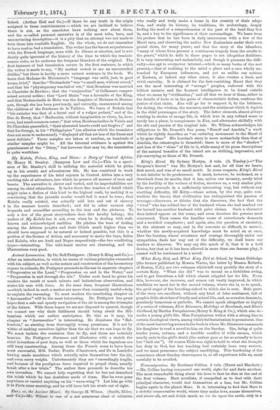tion, and study its history, its traditions, its archaeology, deeply
feeling the need of a comprehension of the past of the land they live in, and a key to the significance of their surroundings. We learn from his preface that he has been in daily intercourse with a few of the Maori race, and observing the native New Zealanders under their own genial skies, for many years ; and that the story of the islanders, "many of whose lives present a continuous tragedy from the cradle to the grave," which he tells in these pages is not altogether fictitious. It is very interesting and melancholy, and though it presents the diffi- culty—too apt to overpower interest—which so many books of the sort present,—that of realising to the mind a place and a race wholly un- touched by European influences, and yet as unlike our notions of Eastern, or indeed any other races, it also creates a fresh and vivid curiosity. It is claimed for the fast-vanishing Maori that they are the most interesting of "savage " peoples, endowed with the loftiest natures and the keenest intelligence to bo found outside what we mean by " civilisation ;" and all that we hear of them, either in the details of facts or in the guise of characteristic fiction, confirms the justice of that claim. Ena will go far to support it, by the loftiness, the daring, the wisdom, the resource, and the sentiment which it depicts in the chief personages of the story. The latter element, almost always wanting in stories of savage life, in which love in any refined sense so rarely has a place, is conspicuous in Ena, and alternates skilfully with the stir and passion of the tragical tale. Mr. Wilson acknowledges his obligations to Mr. Domett's fine poem, "Ranolf and Amohia," a work which he rightly describes as "an enduring monument to the Maori of a by-gone time." His heroine's story is more melancholy than that of Amohia, the catastrophe is threefold; there is more of the " shadow " and less of the " shine " of life in it, while many of its prose descriptions of the natural beauties of the island are as striking, impressive, and joy-conveying as those of Mr. Domett.


































 Previous page
Previous page